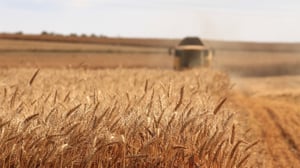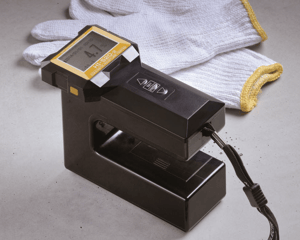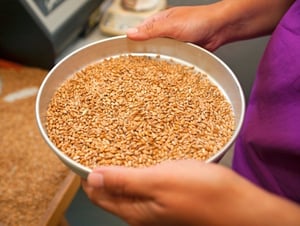
From farm to supermarket to your table and every step in between, there is a constant battle to store food and maintain the perfect level of moisture to maintain the it’s longevity. Too much moisture, and your food is susceptible to mold growth, spoilage, and staleness. Too little moisture, and a product may dry out and lose its desired flavor or texture.
Because of this, much of the processing that food undergoes to ready it for the supermarket is constantly monitored by a moisture meter. Moisture meters simplify and speed the process through which our food is made, packaged, and distributed to stores; they remove all the guesswork and unnecessary wait time.
On the Farm
For products involving produce or grains, moisture meters not only help with knowing when to harvest a crop, but they also help with properly storing grain in order to keep it viable for use and safe to eat. Moisture meters like the Riceter, which (among other things) help to determine the best time for rice and other grains to be harvested, keeping crop yields high and costs to farmers and consumers low.
Other moisture meters have been designed to test the moisture levels of grains like barley and wheat, and even others are engineered specifically to measure the levels of moisture in dry ingredients like flour, which can quickly spoil with too much moisture.
Indirectly, even our livestock benefit from moisture meters. Much of the corn and grain that is stored long-term for feed must maintain the correct level of moisture throughout an entire grain silo in order for it to be safe for animals to eat. This long-term storage is a complicated process that requires a delicate balance of moisture, and without a moisture meter, this long-term storage could not happen.
Produce Longevity
The fresher your produce, the higher its levels of vitamins and nutrients are going to be. Fresher produce also looks and tastes better than its less fresh counterparts. Moisture meters are an important part of keeping produce fresh until you’re ready to bring it home to share with your family.
Humidity levels are a huge factor in keeping fruits and vegetables fresh and appetizing. Too much humidity and foods can become soft, soggy, and even rot, while not enough humidity can lead to wilted, thirsty fruits and vegetables. Interestingly enough, different kinds of produce require different levels of humidity, which could be complicated without the use of a universal moisture meter to monitor moisture levels of the produce and its storage facility.
Packaging Freshness
Another way moisture meters simplify the food processing industry? Maintaining the correct levels of moisture in packaging materials. Moisture regulation is key to freshness and taste, especially when it comes to products like bread or cake mixes. Packaging must be created to maintain a certain level of moisture, from how a bag is sealed to even the level of moisture content in paper or cardboard packaging. This keeps ingredients like flours and sugars dry and usable as well.
A paper moisture meter removes any level of guesswork about whether a box has been created with or exposed to too much moisture. It’s also fast; with near-instant results, using a paper moisture meter is a simple, quick way to check food packaging for optimum freshness.
Likewise, a near-infrared (NIR) moisture meter is able to gauge moisture levels within packaging, so cake mixes and cereals are as fresh when you open them as they were the day they were packaged. Since each product requires a different level of moisture, a meter with the ability to have multiple product calibrations is the fastest, simplest way to monitor these levels.
From farm to processing to packaging, moisture meters are available every step of the way, to make the manufacturing and transporting of food a more precise science. By removing any level of guesswork and giving accurate results, moisture meters can help with nearly every step of the food processing industry.
Contact us today to see how a moisture meter can make a difference in your corner of the food industry, with better tasting products and an easier process.



